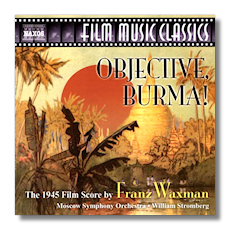
The Internet's Premier Classical Music Source
Related Links
- Latest Reviews
- More Reviews
-
By Composer
-
Collections
DVD & Blu-ray
Books
Concert Reviews
Articles/Interviews
Software
Audio
Search Amazon
Recommended Links
Site News
 CD Review
CD Review
Franz Waxman

Objective, Burma!
- Score restored by John Morgan
Moscow Symphony Orchestra/William T. Stromberg
Naxos 8.557706 71:38
Summary for the Busy Executive: Influential score by a major film composer.
In a crowd of crude propaganda films made during World War II, Raoul Walsh's 1945 Objective, Burma!, starring Errol Flynn, stands out as a good picture, still eminently watchable. The plot, an update of Kenneth Roberts's Northwest Passage (made into another good movie by King Vidor in 1940, starring Spencer Tracy), concerns a small commando unit sent to destroy an important target. They complete the mission but get caught behind enemy lines and must flee the pursuing Japanese. Walsh liked the plot so much, he used it again in his 1951 Distant Drums, with Gary Cooper.
Most movie critics consider Walsh one of the classic action directors of Hollywood, along with Hawks, Ford, and Curtiz. He's probably best known for directing Jimmy Cagney in the masterful White Heat. As a director notorious for leaving actors alone, so long as he got his shot, his films brim full with wonderful performances. Errol Flynn, during his lifetime never much respected as an actor, turns in a grim, stoic job as the commando leader, free of the buckle and swash that made him. Then again, Flynn was always a good actor, like Spencer Tracy a startlingly modern actor in an era of juicy hambones, like John Barrymore, Bette Davis, and Fredric March, all of whom, despite their skill, have dated horribly. You can still watch Flynn, even in tights, and accept him as broadly realistic. It takes a good actor to pull off a part like Robin Hood without descending into parody.
Franz Waxman (born Wachsmann, in Germany) began, in deference to his parents, as a bank teller. Out of his salary he paid for music lessons, including lessons in composition. He soon began arranging for German "jazz" dance bands and broke into movies through the recommendation of the great German Kabarett songwriter Friedrich Hollaender. For his first movie gig, he orchestrated Hollaender's score to The Blue Angel. After the international success of that film, he found regular work in German movies. In 1933, at the assumption of Nazi power, the Jewish Waxman fled to France, working in French films, then to England, and finally arrived in Hollywood in 1935. His first picture, the classic Bride of Frankenstein, introduced modern musical language to the Hollywood film (and featured one of the early uses of the theremin, beating Rózsa's Spellbound by a decade). Despite providing scores for such classics as Fury, his career breakthrough came with his music for Hitchcock's Rebecca (1940), probably his best film score, although not one he received the Academy Award for. For film buffs, he resides in the pantheon of Korngold, Rózsa, Herrmann, Stallings, Webb, and Tiomkin. He was also an occasional classical composer. I can strongly recommend his Sinfonietta for strings and timpani (available on Koch B000001SFK, along with Rózsa's Concerto for String Orchestra and Herrmann's Sinfonietta for strings).
Waxman's music for Objective, Burma! may not stand with his very best, but, like the film itself, it was miles ahead of most similar work. Waxman was even ahead of his time, demonstrated by the fact that Warner Bros. kept raiding his score for war films in which he had no direct involvement: Merrill's Marauders, PT 109, Up Periscope, and so on. The music works beautifully in the film, avoiding the clichés of orientalism – especially in portraying the Japanese. It's more a matter of orchestration than the usual silly pentatonic riffs. Outside the film, the music works less well, narrating in the standard-practice, almost Mickey-Mouse way pioneered by Max Steiner. In other words, it sounds like a Warner Bros. film of the period. Waxman's scores to Rebecca and Fury, written years before, are already beyond this. Perhaps Steiner, the notoriously conservative head of the Warners' music department, put the kibosh on anything else. In general, the most musically-advanced composer at Warners was Carl Stallings of the cartoon unit, and only because no studio executive thought cartoons worth troubling over. Still, Waxman gets away with an idiom which owes more to Prokofieff than to Tchaikovsky. The backbone of the score is a march full of harmonic side-steps, and Waxman puts it to several emotional uses: triumph, of course, but also weariness and despair.
John Morgan and William Stromberg have not only cleaned up the score, they have discovered cues not heard in the original film. It's nice to have it all. The "Jumping" cue, depicting the commandos parachuting out of the plane, influenced other film composers. The discovery of the slaughter of one group of commandos in a deserted village for me is the most powerful sequence in the score – perhaps in the movie as well – and the one which hangs together best divorced from its images. The Moscow Philharmonic plays a little rough, but Stromberg at least keeps the music alive. Recommended, especially to fans of film music.
Copyright © 2007, Steve Schwartz




















